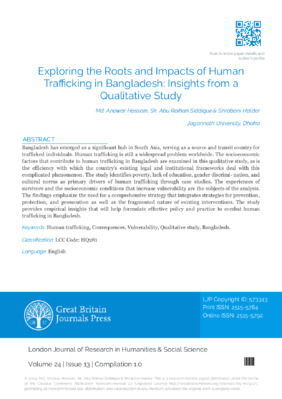Exploring the Roots and Impacts of Human Trafficking in Bangladesh: Insights from a Qualitative Study
Abstract
Bangladesh has emerged as a significant hub in South Asia, serving as a source and transit country for trafficked individuals. Human trafficking is still a widespread problem worldwide. The socioeconomic factors that contribute to human trafficking in Bangladesh are examined in this qualitative study, as is the efficiency with which the country's existing legal and institutional frameworks deal with this complicated phenomenon. The study identifies poverty, lack of education, gender discrimination, and cultural norms as primary drivers of human trafficking through interviews and case studies. The experiences of survivors and the socioeconomic conditions that increase vulnerability are the subjects of the analysis. The findings emphasize the need for a comprehensive strategy that integrates strategies for prevention, protection, and prosecution as well as the fragmented nature of existing interventions. The study provides empirical insights that will help formulate effective policy and practice to combat human trafficking in Bangladesh.
References

Downloads
Published
Issue
Section
License
Copyright (c) 2024 Authors and Global Journals Private Limited

This work is licensed under a Creative Commons Attribution 4.0 International License.





